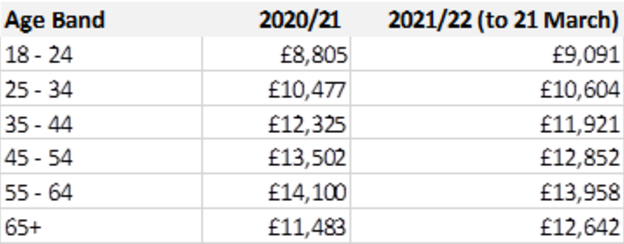
The Isa allowance is "irrelevant" for young people who are not saving enough to begin with and as such "isn’t a particularly useful message", experts have said.
Victor Trokoudes, co-founder and chief executive of investment app Plum, said young investors would be better served by being nudged to make regular contributions.
The average total amount saved into Isas is around £6,450 for 18–24 year-olds while for 25–34 year-olds it is £7,750, according to data from HM Revenue & Customs. This compares with about £52,590 among those aged 65 and over.
Plum’s own user data shows savers deposited around £150 per month on average, which means they were a long way away from the annual allowance limit of £20,000.
Trokoudes said: “Every year we see reminders that the end of the tax year is approaching and to fill up our Isa allowances. But this isn’t a particularly useful message for young people that struggle to get anywhere close to that amount.
“In fact, the tax-free allowance is more or less irrelevant to millions of people on average incomes, who can’t afford to save £20,000 a year.
“Instead, Plum wants to remind savers and investors that it is small, manageable, regular contributions that matter the most to building short-term security and long-term wealth."
Becky O’Connor, head of pensions and savings at Interactive Investor, agreed, saying for many younger people on lower incomes the idea of having £20,000 to save out of their annual income was "laughable".
But she said there were some young higher earners who would view the Isa annual allowance as an "aspirational target they could hit with a bit of frugality and diligence", while those inheriting money would also benefit.
Average Isa savings by Interactive Investor clients by age:
Source: Interactive Investor
“The lesson of paying tax you could have legitimately not had to pay is a hard lesson to learn and one worth sparing young investors from," she said.
But she added: “It’s important not to put younger investors off Isas with language or concepts they aren’t as familiar with – like ‘the end of the tax year’ and ‘Isa season’ and repeated mentions of a £20,000 allowance that seems so ridiculously unobtainable and just makes people feel poor and like they shouldn’t bother, as they can’t get anywhere near it.
“Making sure that younger people know that every penny counts and any small amount is worth putting away if it’s going spare is positive and encouraging. It doesn’t matter if it’s just £200 a year – it’s something."
Plum said investing £100 a month, with an average return of 11 per cent, based on the average annualised returns of the MSCI World Index between 2021 and 2022, would yield an investor £85,000, with £24,000 of contributions over the space of 20 years.
Over 30 years it would yield £270,000 with just under £36,000 of contributions.
A worthy goal
Trokoudes said regular contributions were particularly important in the current environment of rising living costs.






